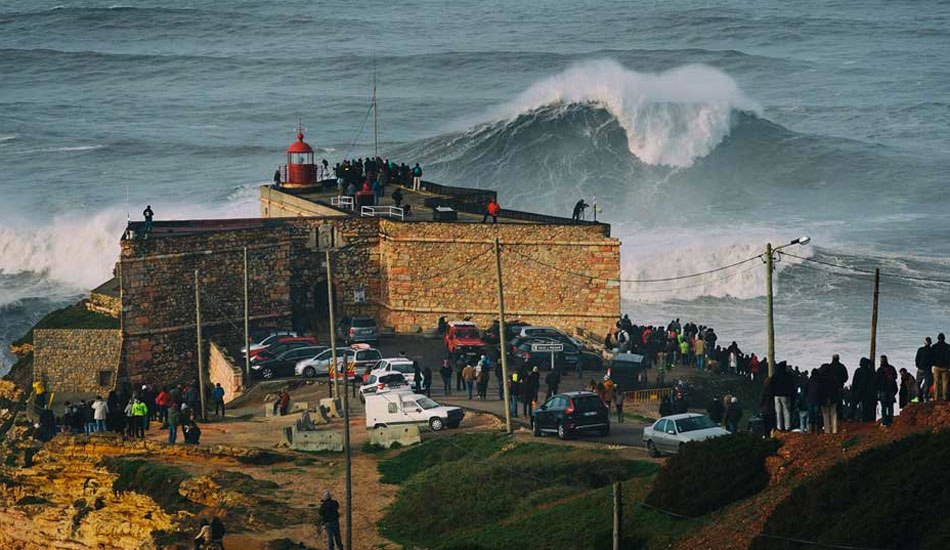
Nazare, the biggest of big wave spots. A new study found a direct link between warming seas and bigger waves. Photo: Joao Bracourt
As you know, large storm systems cause large waves. Large storm systems are caused by a complex variety of things, but for brevity’s sake, we’ll make things simple. Storms are helped along as water evaporating off the ocean turns into clouds. The warmer the water, the more evaporation there is, and the more energy available for the storm. A new study recently released in Nature Communications found that the warming oceans are directly linked to much larger waves. Sounds good if you’re a surfer, right? Well, it could be, but let’s try not to be so selfish, shall we?
Those bigger waves, paired with rising sea levels and the rapidly increasing frequency of larger and larger storms, is likely to wreak havoc on coastal communities in the near future. Let’s, for a second, read a few paragraphs from a fictional story about the dystopian future of surf that may prove to be correct:
“The storms are getting worse, too. One of the last years I surfed, 2025 or 2026, was one of those great El Nino years. The whole winter was full of massive swells, wrapping their way around points, tripping over reefs, unloading that awesome force that only Mother Nature can produce. I remember spending that whole winter tired. Shoulders wrecked, back fucked up, salt water pouring out of my nose every time I leaned over. I’ve probably built it up in my head a bit, but you get the idea. Thing is, though, the next year was better. And the next, and the next. Until it wasn’t better.”
Before that winter, it was a big deal if a surfer died–it just didn’t happen. Yeah, a few times here and there – guys like Sion, Foo, Malik–people no one really remembers now, except for a few who like to tell stories. Then, though, they were memorialized. Until storms got so violent that a surfer was about as likely to die as they were to survive.”
Fictional stories about the future aside, the study was done by researchers at the University of California, Santa Cruz. “For the first time, we have identified a global signal of the effect of global warming in wave climate,” said the study’s lead author, Borja G. Reguero. “In fact, wave power has increased globally by 0.4 percent per year since 1948, and this increase is correlated with the increasing sea-surface temperatures, both globally and by ocean regions.”
As I said before, the whole thing is very complicated. The ocean and the climate are so closely linked they could be considered one entity. Global currents affect weather, weather affects currents, warming and cooling affects both, and both affect warming and cooling. It’s a great big wheel of spinning parts, all balancing each other out to create a climate that, for a long time, has been relatively stable. Now—if you believe in that pesky evidence-based science, at least—things are changing far more rapidly than they should be, and they’re changing because of us. The temperature at the top few feet-or-so of the ocean greatly affects global wind patterns, and those wind patterns affect waves.
The energy that is transferred from wind and into waves is called simply “wave power,” and the team at USC Santa Cruz studied the link between wave power and sea surface temperatures. “Results indicate the upper-ocean warming, a consequence of anthropogenic global warming, is changing the global wave climate, making waves stronger,” the team reported.
It’s an interesting study, not only because it indicates that we’re in for a hell of a ride when it comes to waves in the coming years, but because it uses wave power as another indicator of climate change.
“This study shows that the global wave power can be a potentially valuable indicator of global warming,” said study co-author Inigo J. Losada, “similar to carbon dioxide concentration, the global sea level rise, or the global surface atmospheric temperature.”

